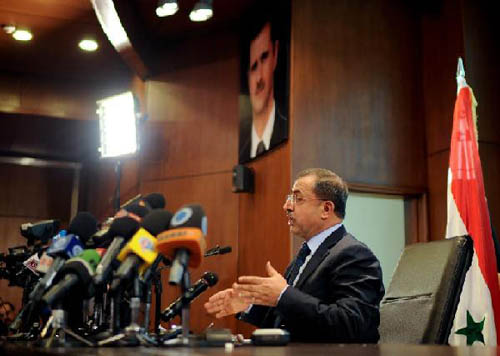|
 |
|
Syria's Interior Minister Mohammad Chaar attends the press conference in Damascus, Syria, on February 27, 2012. Chaar said Sunday that a total of 8,376,447 citizens, or 57.4 percent of eligible voters, voted in the referendum on the new draft constitution, with 7,490,319 (89.4 percent) agreeing to it and 753,208 (9 percent) saying "No"(XINHUA) |
Syria announced Monday the result of a referendum on the new draft constitution held a day earlier, saying that more than 89 percent of eligible voters supported the new charter.
The result was met with skepticism of the Syrian opposition, which dismissed it as "unreal and totally fabricated."
"I can say for sure that these numbers have nothing to do with the reality and are totally fabricated," Abdulaziz Khaier, a member of the opposing National Coordination Body, told Xinhua on Monday.
Earlier Monday, Syrian Interior Minister Mohammad Chaar said as many as 89.4 percent of voters supported the new draft constitution.
Chaar told a press conference that a total of 8,376,447 citizens, or 57.4 percent of eligible voters, voted in the referendum on the new draft constitution, with 7,490,319 of them agreeing to it and 753,208 saying "no".
There are 132,920 invalid ballots, which makes up 1.6 percent of the votes, Chaar said.
The minister added that there was a good turnout, despite threats by some armed terrorist groups in certain areas and distortion and instigation campaigns by external media, which attempted to prevent citizens from practicing their right for voting and to harm the democratic process.
However, Khaier said he had predicted these results even before Chaar's announcement, "because we have become accustomed to such games in Syria."
"We don't trust the polling rates, especially in the absence of Arab and international supervision over the referendum process," said Loai Hussain, head of the opposing "Building Syria State" party.
"The Syrian government provided us with nothing to believe its charts and statistics about the results," he added.
The referendum started early Sunday morning and over 14 million Syrians were eligible to vote at 13,835 ballot centers across the country.
Voters made their choice by ticking a green ring that says "yes " or a purple one to say "no" to the draft constitution, which aimed to restore stability in the unrest-hit country and give a limit of two seven-year terms to the president.
Under the new draft constitution, President Bashar al-Assad will end his two seven-year terms in 2014 at the latest, as well as his family's decades of rule in the country.
The new constitution is also expected to allow Syrian citizens to enjoy more freedom, end the monopoly of the ruling Baath Party and set a timetable for multi-party elections.
However, U.S. Secretary of State Hillary Clinton called Sunday' s referendum "a cynical ploy" and called Assad's supporters to change their stances, while German Foreign Minister Guido Westerwelle dismissed the polls as a "farce."
The Syrian government has repeatedly dismissed the Western uproar as "flagrant interference in the country's internal affairs. "
In an interview with Xinhua on Monday, Syrian Deputy Foreign Minister Faisal Mekdad reiterated what the Syrian government has been claiming since the start of unrest in mid March 2011 about the presence of armed terrorist groups in the country backed by regional and international powers.
"There are plans by superpowers and the West in general to support those gunmen to disrupt the achievements of the Syrian people and to change Syria's political path," he said.
As the Syrian government keeps accusing the West of fueling the situation in Syria, the European Union (EU) on Monday stepped up restrictive measures against Syria over "the Syrian regime's continued use of violence against civilians."
According to a conclusion adopted by the EU foreign ministers who met in Brussels, trade in gold, precious metals and diamonds with Syrian public bodies and central bank would no longer be permitted.
Cargo flights operated by Syrian carriers would no longer have access to the EU airports.
The 27-member bloc also froze the assets of the Syrian central bank within the EU, but said legitimate trade could continue under strict conditions.
Meanwhile, seven ministers of the Syrian government allegedly associated with human rights violations were subjected to asset freezes and visa bans.
Hamdi al-Abdullah, an economic expert, said that Syria can adapt to the new sanctions as it did before with the previous ones, noting that the new sanctions' potential damage should be calculated and dealt with according to their impacts on the Syrian economy.
Another expert, Hayan Salman, stressed that the sanctions were politically motivated but with economic covers. He called on the Syrian government to enact a free zone area with Lebanon, Iraq and central Asia to avoid the repercussions of the Western sanctions.
(Xinhua News Agency February 28, 2012) | 